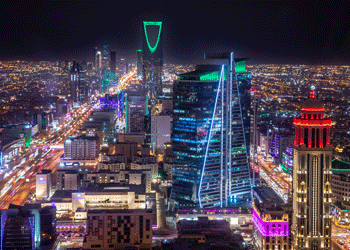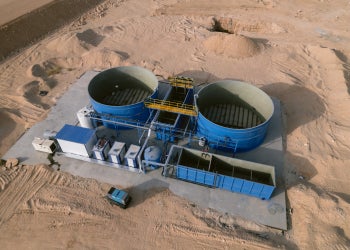Adnoc Drilling wins $1.63bn contract from Adnoc Offshore
17 April 2025
Register for MEED’s 14-day trial access
Adnoc Drilling has announced that its integrated drilling services unit has secured a contract worth $1.63bn from fellow Abu Dhabi National Oil Company (Adnoc Group) entity, Adnoc Offshore.
The five-year contract covers the provision of directional drilling, drilling fluids, cementing, wireline logging and tubular running, Adnoc Drilling said in a statement on 17 April.
“The award incorporates advanced engineering and technical support for the effective delivery of extended reach and maximum reservoir wells offshore,” Adnoc Drilling said.
“This contract supports the growing oil field services segment, and its economic impact is already included in the current 2025 and 2026 guidance, underpinning the visibility of Adnoc Drilling’s business model and in support of the company’s financial targets,” the Abu Dhabi Securities Exchange-listed company added.
For full-year 2024, Adnoc Drilling announced a net profit $1.3bn, a year-on-year increase of 26%.
The company’s full-year revenue grew 32% year-on-year to $4.03bn. Earnings before interest, taxes, depreciation, and amortisation (Ebitda) also rose 36% year-on-year to $2.01bn.
Additionally, Adnoc Drilling said in its guidance for 2025 that it expects total revenue of $4.6bn-$4.8bn and Ebitda of $2.15bn-$2.3bn, with a margin range of 46%-48%. Net profit is expected to be $1.35-$1.45bn, with a margin range of 28%-30%.
The company expects capital expenditure in 2025 of $350m-$550m and a free cash flow (excluding mergers and acquisitions) of $1.3bn-$1.6bn, while maintaining a conservative leverage target of up to 2.0x net debt/Ebitda.
In 2025, Adnoc Drilling intends to enhance its operational capacity, projecting a rig count of over 148 by 2026 and more than 151 by 2028.
The company revealed it has secured a contract extension in Jordan and achieved prequalification in Kuwait and Oman, “paving the way for further regional expansion in 2025”.
In light of the positive financial results in 2024, Adnoc Drilling approved a cash dividend payment of $394m, bringing total dividends for the year to $788m, representing a 10% year-on-year increase.
Looking ahead, Adnoc Drilling said it seeks to increase dividends to at least $867m for 2025, and reach at least $1.15bn by 2028, based on its minimum 10% year-on-year dividend increase policy.
Growth through acquisitions
Achieving inorganic growth through strategic acquisitions is a key aspect of Adnoc Drilling’s expansion blueprint.
With this in mind, Adnoc Drilling partnered with Abu Dhabi-based Alpha Dhabi Holdings in November 2023 to establish Enersol, which has a mandate to invest up to $1.5bn in acquisitions.
To date, Enersol has announced acquisitions worth approximately $800m to acquire majority stakes in four technology-enabled oil field service companies, and “looking ahead, it aims to solidify its position as an AI [artificial intelligence]-centric investment company”, Adnoc Drilling said.
Enersol completed a transaction it started last July to acquire the majority 51% stake in UAE-based oil and gas services provider NTS Amega. The value of the transaction is estimated to be $58m.
Enersol also closed a transaction with UK-based private equity firm Dunedin to fully acquire US-headquartered EV Holdings. The transaction, started in August, is valued at $45m.
The joint venture then completed a transaction worth $207m to acquire the majority 42.205% stake in US oil and gas drilling services provider Gordon Technologies. Following the completion of the transaction in September, Enersol owns 67.205% of shares in the US firm.
ALSO READ: Abu Dhabi AI firm and SLB sign cooperation agreement
During the last quarter of 2024, Enersol signed an agreement to acquire a 95% equity stake in US-based Deep Well Services for $223m.
Separately, Adnoc Drilling said Turnwell Industries, its joint venture with the Middle East arm of US oil field services provider SLB and US firm Patterson-UTI International Holdings, has made progress with work on a $1.7bn contract awarded by Adnoc Group last May to provide drilling and associated services for the recovery of unconventional oil and gas resources in Abu Dhabi.
Turnwell has delivered a total of 30 wells to Adnoc to date as part of its scope of work, with the initial wells delivered within 16 days of the contract award.
The broad scope of work on the contract covers drilling and appraisal of a total of 144 unconventional oil and gas wells.
Abu Dhabi is estimated to hold unconventional resources of 220 billion barrels of oil and 460 trillion cubic feet of gas in place.
ALSO READ: Abu Dhabi AI firm and SLB sign cooperation agreement
MEED’s May 2025 report on the UAE includes:
> GOVERNMENT & ECONOMY: UAE looks to economic longevity
> BANKING: UAE banks dig in for new era
> UPSTREAM: Adnoc in cruise control with oil and gas targets
> DOWNSTREAM: Abu Dhabi chemicals sector sees relentless growth
> POWER: AI accelerates UAE power generation projects sector
> CONSTRUCTION: Dubai construction continues to lead region
> TRANSPORT: UAE accelerates its $60bn transport push
Exclusive from Meed
-
 Solar deals signal Saudi Arabia’s energy ambitions
Solar deals signal Saudi Arabia’s energy ambitions13 February 2026
-
 Saudi Arabia appoints new investment minister
Saudi Arabia appoints new investment minister13 February 2026
-
 Indian firm wins major Oman substation contract
Indian firm wins major Oman substation contract12 February 2026
-
 Developers appoint contractor for $500m wastewater treatment project
Developers appoint contractor for $500m wastewater treatment project12 February 2026
-
 Dewa raises Empower stake in $1.41bn deal
Dewa raises Empower stake in $1.41bn deal12 February 2026
All of this is only 1% of what MEED.com has to offer
Subscribe now and unlock all the 153,671 articles on MEED.com
- All the latest news, data, and market intelligence across MENA at your fingerprints
- First-hand updates and inside information on projects, clients and competitors that matter to you
- 20 years' archive of information, data, and news for you to access at your convenience
- Strategize to succeed and minimise risks with timely analysis of current and future market trends

Related Articles
-
 Solar deals signal Saudi Arabia’s energy ambitions
Solar deals signal Saudi Arabia’s energy ambitions13 February 2026
 Commentary
Commentary
Mark Dowdall
Power & water editorSaudi Arabia’s recent agreement to build $2bn-worth of solar power plants in Turkiye is the latest sign that the kingdom’s energy influence is changing.
Historically, this was measured in oil barrels and export volumes. Increasingly, this is extending to capital, structuring expertise and the ability to deliver record-low tariffs in competitive markets.
Announcing the deal, Turkish Energy Minister Alparslan Bayraktar said tariffs for the plants would be the country’s lowest on record, with electricity purchased under 25-year power purchase agreements.
It followed another announcement, in January, that Acwa is investing $200m to build a large-scale solar photovoltaic (PV) plant in the Philippines.
Whether Saudi-backed companies ultimately retain long-term stakes or primarily develop and build the assets, their role at the front end is significant.
Sponsors that bring sovereign backing, clear procurement processes and access to low-cost financing can influence tariffs and contract terms from the outset.
There is also a geopolitical layer. Investing in Turkiye, or anywhere for that matter, strengthens political and economic ties at a time when regional alignments are shifting.
Energy infrastructure is also long-term by its nature. It connects ministries, regulators, lenders and operators in relationships that often extend well beyond a single transaction.
Saudi Arabia has spent the past few years refining its approach to pricing, structuring and financing large-scale renewables at home.
Exporting that expertise may not rival oil in scale or visibility, but it does signal that Saudi Arabia is becoming more than just an energy supplier.
Increasingly, it is becoming a participant in how other countries design and finance their energy transitions. That influence is still significant.
https://image.digitalinsightresearch.in/uploads/NewsArticle/15645903/main.jpg -
 Saudi Arabia appoints new investment minister
Saudi Arabia appoints new investment minister13 February 2026
Register for MEED’s 14-day trial access
King Salman Bin Abdulaziz Al-Saud has made a series of senior government changes, including Khalid Al-Falih leaving his role as investment minister to become minister of state and a member of the cabinet.
Al-Falih has been replaced by Fahad Al-Saif as investment minister. Al-Saif has been head of the Investment Strategy and Economic Insights Division at the Public Investment Fund (PIF) since 2024. That role involved formulating PIF’s long-term investment strategy. He has also served as head of the Global Capital Finance Division, a role he has held since joining PIF in 2021.
The change of investment minister comes at a time when securing investments has become a key priority for Saudi Arabia as it prepares to hand over more projects to the private sector for delivery.
King Salman also named Abdullah Al-Maghlouth as vice-minister of media and Abdulmohsen Al-Mazyad as vice-minister of tourism. Khalid Al-Yousef was named attorney general, and Sheikh Ali Al-Ahaideb will serve as president of the Board of Grievances.
Faihan Al-Sahli was selected as director general of the General Directorate of Investigation, while Abdulaziz Al-Arifi was chosen to lead the National Development Fund. Haytham Al-Ohali will head the Communications, Space and Technology Commission, and Fawaz Al-Sahli will chair the Transport General Authority.
https://image.digitalinsightresearch.in/uploads/NewsArticle/15645415/main.gif -
 Indian firm wins major Oman substation contract
Indian firm wins major Oman substation contract12 February 2026

India’s Larsen & Toubro has won a contract to build the Majan 400/220/132kV grid station in Oman.
Estimated to cost $100m, the project includes an associated 400kV line-in line-out underground cable from Sohar Free Zone to the Sohar Interconnector Station.
The contract was awarded by Oman Electricity Transmission Company (OETC), part of the government-owned Nama Group.
The grid station will comprise eight 400kV gas-insulated switchgear (GIS) bays, eight 220kV GIS bays and 10 132kV GIS bays at the new Sohar Free Zone substation.
The scope includes the installation of two 500MVA, 400/220kV transformers and two 500MVA, 220/132kV transformers.
Local firm Monenco Consulting Engineers was appointed in April last year to provide design and supervision services for the project.
As MEED exclusively revealed, the main contract was tendered in June, as part of three significant contracts to build new substations in the sultanate.
The second contract, worth about $35m, covers the construction of the Sultan Haitham City 132/33kV grid station and associated 132kV line-in line-out underground cables running 4 kilometres from Mabella to Mabella Industrial Zone.
The third contract, valued at about $100m, covers the construction of the Surab 400/33kV grid station and an associated 400kV line-in line-out cable from the Duqm grid station to the Mahout grid station.
Local firms Muscat Engineering Consulting and Hamed Engineering Services are consultants for the Sultan Haitham City and Surab projects, respectively.
The two remaining contracts are currently under bid evaluation, with awards expected this quarter.
https://image.digitalinsightresearch.in/uploads/NewsArticle/15638107/main.jpg -
 Developers appoint contractor for $500m wastewater treatment project
Developers appoint contractor for $500m wastewater treatment project12 February 2026

Register for MEED’s 14-day trial access
Egypt’s Orascom Construction has won the engineering, procurement and construction (EPC) contract for a major wastewater treatment project in Saudi Arabia’s Eastern Province.
A consortium of Saudi utilities provider Marafiq, the regional business of France’s Veolia and Bahrain/Saudi Arabia-based Lamar Holding is developing the $500m (SR1.875bn) industrial wastewater treatment plant (IWWTP) in Jubail Industrial City 2.
Sources close to the project confirmed the appointment to MEED, adding that the project has now entered the construction phase.
Industry sources also said that financial close on the project is expected to be reached in the coming days.
In September, the developer consortium was awarded a contract, under a 30-year concession agreement, by Saudi Aramco Total Refining & Petrochemical Company (Satorp), a joint venture of Saudi Aramco and France’s TotalEnergies.
The planned facility will treat and recycle wastewater from Satorp’s under-construction Amiral chemical derivatives complex, also in Jubail.
Marafiq, formally Power & Water Utility Company for Jubail and Yanbu, will own a 40% stake in the dedicated project company. Veolia Middle East SAS will hold a 35% stake, and Lamar Holding’s Lamar Arabia for Energy will hold the other 25%.
The planned IWWTP, which will primarily serve the $11bn sprawling Amiral chemicals zone, will implement advanced water treatment and recovery technologies to process complex industrial effluents, including spent caustic streams. Treated water will be reintegrated into the industrial processes, supporting closed-loop reuse and energy efficiency.
The project follows a concession-style model, akin to a public-private partnership (PPP), where the developer consortium invests in, builds and operates the wastewater plant over a 30-year period, with returns linked to service delivery.
Marafiq has been involved in several similar projects across Saudi Arabia, including as the sole owner of the Jubail industrial water treatment plant (IWTP8), which treats complex industrial effluents for petrochemical and heavy industrial companies.
In 2020, Saudi Services for Electro Mechanic Works was awarded the $202m main contract for the fourth expansion phase of IWTP8. Construction works on the project are expected to be completed by the end of the quarter.
 READ THE FEBRUARY 2026 MEED BUSINESS REVIEW – click here to view PDF
READ THE FEBRUARY 2026 MEED BUSINESS REVIEW – click here to view PDFSpending on oil and gas production surges; Doha’s efforts support extraordinary growth in 2026; Water sector regains momentum in 2025.
Distributed to senior decision-makers in the region and around the world, the February 2026 edition of MEED Business Review includes:
> AGENDA: Mena upstream spending set to soar> INDUSTRY REPORT: MEED's GCC water developer ranking> INDUSTRY REPORT: Pipeline boom lifts Mena water awards> MARKET FOCUS: Qatar’s strategy falls into place> CURRENT AFFAIRS: Iran protests elevate regional uncertainty> CONTRACT AWARDS: Contract awards decline in 2025> LEADERSHIP: Tomorrow’s communities must heal us, not just house us> INTERVIEW: AtkinsRealis on building faster> LEADERSHIP: Energy security starts with rethinking wasteTo see previous issues of MEED Business Review, please click herehttps://image.digitalinsightresearch.in/uploads/NewsArticle/15637523/main.jpg -
 Dewa raises Empower stake in $1.41bn deal
Dewa raises Empower stake in $1.41bn deal12 February 2026
Dubai Electricity & Water Authority (Dewa) has announced it has increased its stake in Emirates Central Cooling Systems Corporation (Empower) from 56% to 80%.
The transaction was completed through the purchase of 2.4 billion shares and the transfer of the entire ownership of Emirates Power Investment (EPI), which is wholly owned by Dubai Holding.
The total value of the deal is AED5.184bn ($1.41bn).
Empower currently holds over 80% of Dubai’s district cooling market and operates 88 district cooling plants across the emirate.
According to MEED Projects, the UAE’s district cooling sector currently has nine projects worth $1.29bn in the pre-execution phase.
Empower has ownership in four of these projects, which have a combined value of $472m.
This includes a $200 million district cooling plant at Dubai Science Park, with a total capacity of 47,000 refrigeration tonnes serving 80 buildings.
Empower signed a contract to design the plant last August, with construction scheduled to begin by the end of the first quarter of 2026.
The utility is also building a district cooling plant at Dubai Internet City.
UAE-based TMF Euro Foundations was recently appointed as the enabling and piling subcontractor for the project.
https://image.digitalinsightresearch.in/uploads/NewsArticle/15635949/main.jpg


